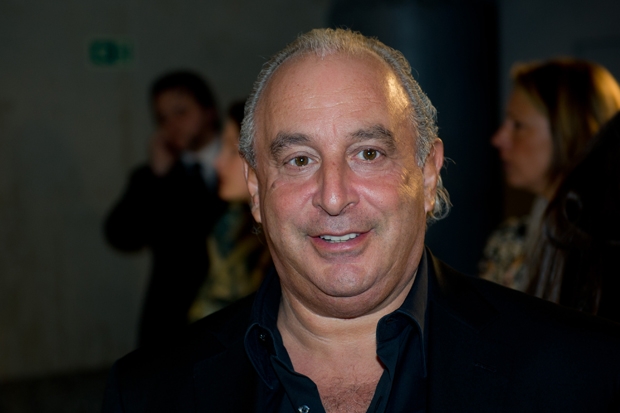Sir Philip Green has dug deep into his bulging pockets to plug the gap in BHS’s pension scheme. But the newspapers are in agreement: the tycoon’s £363m gesture counts for precious little. Even this huge payout won’t save Green’s reputation, says the Sun, which argues that while the former BHS boss has done the ‘right thing’, he should have done it eight months ago. Instead, the Sun says, Green had to be ‘strong-armed by politicians and an avalanche of bad publicity’ to make the right move. So while his decision to cough up will ease the worries of ex-BHS employees, it’s clear that Green has ‘become the poster boy for corporate greed’ – and there’s no changing that, the Sun concludes.
The Daily Mail parrots its nickname of Green as ‘Sir Shifty’ and agrees with the Sun that the tycoon should have acted months ago to shore up the BHS pension fund. It’s true that his contribution ‘will greatly ease the plight of BHS pensioners’, the paper says. It’s also a welcome gesture that Green has said he won’t offset the payment against tax. So, has Green finally turned over a new leaf? The Mail is sceptical. But it says that one thing from this saga is indisputable: ‘this is a victory for a free and uncowed Press’.
It’s not often that the Guardian shares its analysis with the Mail and the Sun, but when it comes to laying into tycoon’s like Green it is prepared to make an exception. The paper says that in forking out hundreds of millions of pounds, the businessman has partly righted a ‘huge wrong’. ‘A rough kind of justice has been served,’ says the Guardian – but the payout is still not enough. What happens to Dominic Chappell, the businessman who bought BHS from Green, for instance? What’s worse, the ‘wider business culture’ which allowed this saga to develop in the first place, remains ‘untackled’, says the paper. It’s clear that while BHS is the most ‘high profile’ victim of this sorry culture, the store chain isn’t alone. Instead, ‘a more formal parliamentary system’ is still needed to tackle bad behaviour in business. Select committees can play a useful role, says the Guardian, but they’re not enough on their own, the paper concludes.
Meanwhile, it’s Ukip’s civil war which is the talking point in the Times. In a statement that will shock no one, the paper says the party is in ‘disarray’. ‘The party is ill’ and may ‘soon die’, the paper adds – suggesting that the party’s problems are two-fold. Firstly, the Times says, Ukip ‘is not selling anything voters want to buy’. As Nigel Farage said himself on the Today programme this morning, the party looks like the turkey that voted for Christmas. The Times agrees, saying that since the referendum ‘there is less hay to be made from this brand of single-issue politics’. The party’s ‘second great woe is ineptitude’, the Times says, suggesting that this ‘toxic’ public row which has spilled over so publicly is merely ‘the tip of the iceberg’. Last year’s series of leadership contests led to ‘weeks of psychodrama’. While the irony is, says the Times, that when Britain leaves the EU, Ukip will lose its main stage – the European parliament – and also a more important element: its funding. ‘When Britain leaves the European Union, their salaries, staff and office space will melt away,’ says the Times, which concludes the future is far from bright for Ukip.







Comments